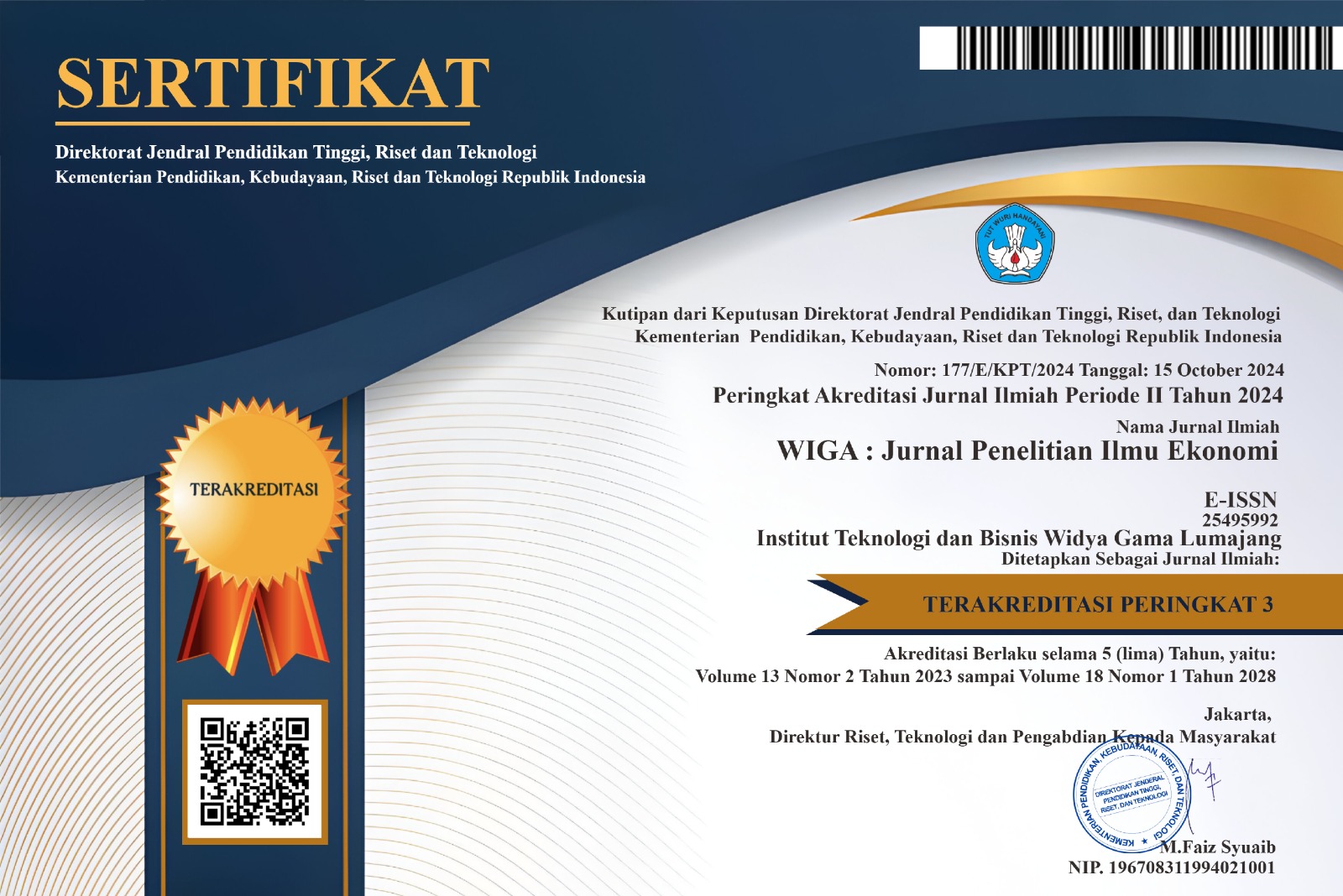Maqashid Shariah and its Influence on Accountability of the Mosque
DOI:
https://doi.org/10.30741/wiga.v14i2.1367Keywords:
Accountability, Participation, TrustAbstract
The goal of this study is to investigate the impact of Maqashid Shariah, as represented by accountability, which is the act of being truthful and accountable. Accountability can be related to both of Maqashid Shariah's goals: the first, to protect religion, or Hifdz Ad-Din, and the second, to preserve life, or Hifdz An-Nafs. This study explores the impact of mosque congregants' confidence and engagement in relation to mosque accountability. The impact of the mosque accountability variable on the trust and engagement of congregants is analyzed and tested through a quantitative manner in this study. The population's features are described using a combination of path analysis and descriptive analysis, two types of quantitative analysis. Using Path analysis and the Structural Equation Modeling (SEM) approach, the hyphotesis is tested. Congregants of five significant mosques located in the East Java districts of Lumajang, Jember, Situbondo, Bondowoso, and Banyuwangi make up the research population. This study used five large mosques with 125 members each as its unit of analysis. The quota sampling method is employed in the sampling procedure. The analysis's findings indicate that while participation has a considerable impact on members' involvement, accountability has no discernible effect on members' confidence.
Downloads
References
Alamad, S. (2023). Conceptualising accounting as a value-based concept in the context of alternative finance. Journal of Accounting Literature, ahead-of-print, ahead-of-print. https://doi.org/10.1108/JAL-03-2023-0042
Al-Qur'an dan terjemahannya. 2008. Departemen Agama RI. Bandung: Diponegoro.
As-Salafiyah, A., Rusydiana, A. S., & Mustafa, M. I. (2022). Maqashid sharia-based mosque empowerment index. International Journal of Ethics and Systems, 38(2), 173-190.
Basri, H., Siti-Nabiha, A. K., & Majid, M. S. A. (2016). Accounting and accountability in religious organizations: An Islamic contemporary scholars’ perspective. Gadjah Mada International Journal of Business, 18(2), 207-230.
Carlisle, M., Millar, M. I., & Jarosz Wukich, J. (2024). Shareholder primacy or stakeholder pluralism? Environmental shareholder proposals and board responses. Accounting, Auditing & Accountability Journal, 37(3), 921-950.
Choi, Y. J., & Leelasribunjong, Y. (2024). Asymmetric effects of GVC on poverty in ASEAN and OECD. International Trade, Politics and Development, 8(2), 82-95.
Ghozali, I., & Fuad. (2014). Structural equation modelling: Teori, konsep, dan aplikasi dengan program Lisrel 9.10. Badan Penerbit UNDIP.
Granà, F., Achilli, G., Giovannoni, E., & Busco, C. (2024). Towards a future-oriented accountability: Accounting for the future through Earth observation data. Accounting, Auditing & Accountability Journal, 37(5), 1487-1511.
Ibrahim, A. H., Rahman, N. N. A., & Saifuddeen, S. M. et al. (2019). Maqasid al-Shariah based Islamic bioethics: A comprehensive approach. Bioethical Inquiry, 16, 333-345.
Jamaluddin. (2021). Implementasi Shariah Enterprise Theory dalam perusahaan manufaktur. Jurnal Ilmu Ekonomi dan Bisnis Islam, 3(2), 136-147. https://doi.org/10.24239/jiebi.v3i2.63.136-147
Kasri, R. A., & Indriani, E. (2022). Empathy or perceived credibility? An empirical study of Muslim donating behaviour through online charitable crowdfunding in Indonesia. International Journal of Islamic and Middle Eastern Finance and Management, 15(5), 829-846.
Kocaman, R., Özmen, M., & Erdoğan, B. Z. (2024). Does being religious or not matter? A qualitative investigation of community fundraising events. Journal of Enterprising Communities: People and Places in the Global Economy, 18(2), 265-287.
Kral, P., & Schnackenberg, A. (2024). Organizational responses to transparency determinants. Management Decision, 62(13), 309-331.
Kuntowijoyo. (2017). Ilmu sosial profetik. Pustaka Pelajar.
Majeed, M. T. (2019). Social capital and economic performance of the Muslim world: Islamic perspectives and empirical evidence. International Journal of Islamic and Middle Eastern Finance and Management, 12(4), 601-622.
Mukhlisin, M. (2021). Level of Maqāsid ul-Shari’āh’s in financial reporting standards for Islamic financial institutions. Journal of Islamic Accounting and Business Research, 12(1), 60-77.
Pennetta, S., Anglani, F., & Mathews, S. (2024). Navigating through entrepreneurial skills, competencies and capabilities: A systematic literature review and the development of the entrepreneurial ability model. Journal of Entrepreneurship in Emerging Economies, 16(4), 1144-1182.
Peraturan Pemerintah No. 71 Tahun 2010.
Pernelet, H. R., & Brennan, N. M. (2023). Impression management at board meetings: Accountability in public and in private. Accounting, Auditing & Accountability Journal, 36(9), 340-369.
Salwani, M. I., Aziz, N. H., Masrek, M. N., & Daud, N. M. (2014). Mosque fund management: Issues on accountability and internal controls. Procedia-Social and Behavioral Sciences, 145, 189-194.
Sofyani, H., Pratolo, S., & Saleh, Z. (2022). Do accountability and transparency promote community trust? Evidence from village government in Indonesia. Journal of Accounting & Organizational Change, 18(3), 397-418.
Triyuwono, I. (2021). Shariah enterprise theory: Humanis, transendental, dan teleologikal. PT Raja Grafindo Persada.
Yang, Y., Brennan, I., & Wilkinson, M. (2014). Public trust and performance measurement in charitable organizations. International Journal of Productivity and Performance Management, 63(6), 779-796.
Yasmin, S., & Haniffa, R. (2017). Accountability and narrative disclosure by Muslim charity organisations in the UK. Journal of Islamic Accounting and Business Research, 8(1), 70-86.
Downloads
Published
How to Cite
Issue
Section
License
Copyright (c) 2024 Riza Ramadhan

This work is licensed under a Creative Commons Attribution-NonCommercial 4.0 International License.










